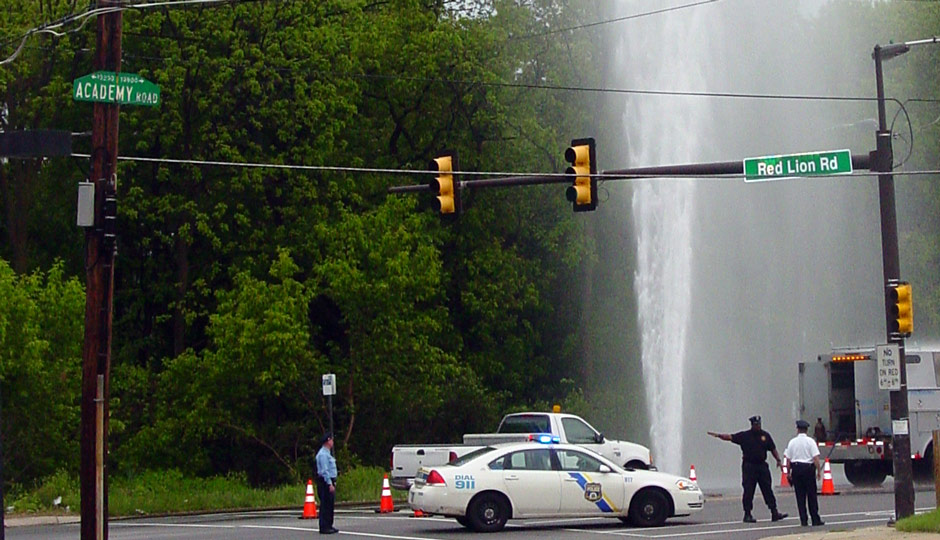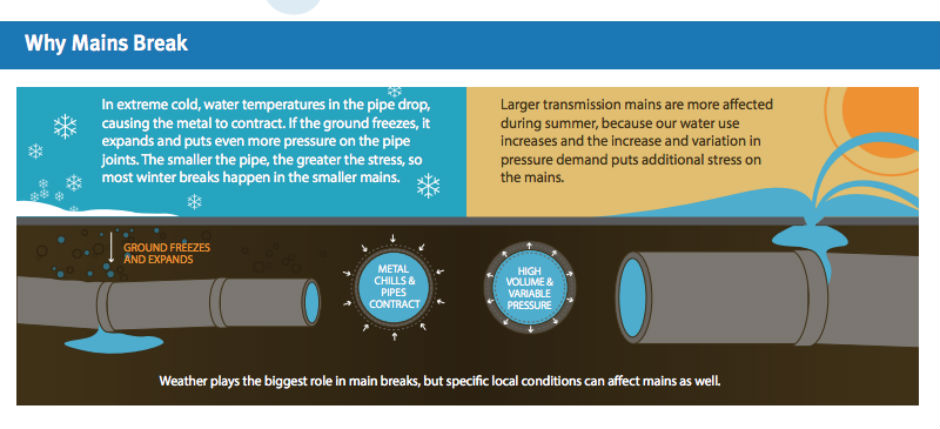Philadelphia: We’re Not Alone in Water Main Breaks

A water main break in 2009 in Far Northeast Philadelphia.
Scan the headlines over the past few months and you see variations on the same headline constantly.
December 10th: Day Care Evacuated After Water Main Breaks. January 18th: “Tacony Water Main Break Shuts Down Road.” February 10th: Massive Water Main Break Sends Water Onto Roosevelt Boulevard.” February 16th: “Ruptures Cause Water Woes Around Area.” February 21st: “Water Main Break Leads to Evacuations, Water Shut Offs.
The Loews Philadelphia Hotel in the old PSFS Building was without water after a water main break on January 10th. “That made it a little challenging to take a shower,” a guest told NBC 10. In mid-January, there were 8 water main breaks in 24 hours.
Yes, there have been a lot of water main breaks this winter. According to the Philadelphia Water Department (PWD), during the current fiscal year which began July 1st and will end June 30th there have been 695 water main breaks in the city. During the previous fiscal year, which included the brutal winter of 2013-’14, Philadelphia had 950 breaks — and 748 through the end of February.
While that may seem like a lot, the truth is: That’s also kind of normal. The city of Philadelphia, like most major cities with old water systems, has a lot of water main breaks every year. Over the past 30 years, Philadelphia has had between 439 and 1,316 water main breaks per fiscal year.
“This winter has been particularly brutal, ensuring water temps in our mains below 40 degrees Fahrenheit consistently, which is the lead contributor to breakage,” says water department spokesperson Joanne Dahme. And with the extreme cold this winter, many cities are dealing with an epidemic of water main breaks.
•
THERE ARE MORE than 3,176 miles of water mains in Philadelphia. And the Philadelphia Water Department grades out better than average: With an average of around 750 breaks a year, Philly has about 240 breaks per 1,000 miles of pipe. The American Water Works Association says the average is 270 per 1,000 miles.
Most water mains in Philadelphia are made of cast iron, a traditional pipe material — the water industry standard until the mid 1960s when ductile iron pipe was introduced. (Ductile iron has a much greater ability to bend without breaking. Ductile iron is a form of cast iron made more durable by adding magnesium while casting.)
Seventy-one percent (2,264 miles) of the city’s water mains are cast iron. Newer ductile iron pipes make up 27 percent (844 miles), while the remaining 2 percent (68 miles) are classified as “other.” (For lots more Philadelphia water stats, go here.) There are, of course, other materials that water mains can be made from; the PVC Pipe Association, for instance, runs the Water Main Break Clock website in an attempt to push polyvinyl chloride pipe as a material.
The city says it inspects for stress and defects an average of 1,000 miles of its water main system each year. But a city can’t just replace the entire water system at once, obviously. And even replacing large sections is cost-prohibitive: Water needs to be turned off, streets need to be dug up, traffic needs to be diverted. The PWD says replacing 10 percent of the system would cost $500 million over 12 years.
To this end, the water department has committed $264 million to improving the water system between fiscal years 2016 and 2021. It has been replacing and average 22 miles of water mains per year. While that’s less than one percent of the system per year, it means that our water mains have a 125 year life-cycle average — pretty good compared to the national average of 200 years. And Dahme at PWD tells us that as part of the department’s capital program, it is upping its efforts in this regard, with a target of replacing 28 miles of new main in 2016. At that rate, the whole system’s life cycle would be closer to 100 years.
•
EXTREME WEATHER IS the biggest culprit in water main breaks. Extreme cold is generally why a pipe might burst in your home; too much pressure builds up in the pipe due to the water expanding as it freezes, causing a backlog which bursts the pipe. But water main breaks don’t come from ice freezing. Colder water inside the mains cause the actual metal of the pipes to contract (see graphic), which increases pressure on pipe joints. This pressure is compounded by corrosion of the pipe over time. Sustained vibration from cars and trucks or construction can exacerbate this corrosion.
Extreme weather also causes the ground around the pipes to expand and contract abruptly, creating even more stress on a pipe and its already-pressurized joints. Water main breaks are most likely to happen when frost permeates into the ground; a persistently snowy winter might mean fewer water main breaks as snow can actually insulate the ground (acting like a literal blanket) so frost isn’t able to permeate quite as deep.

Graphic courtesy of the Philadelphia Water Department.
Newer pipes should be able to deal with this pressure; older pipes, weakened over time, can break in the extreme cold. Philadelphia, for its part, has a well-regarded leak auditing unit that can catch small leaks from weakened pipes. (Hot, dry weather in the summer can also cause similar breaks, though winter water main breaks are generally considered a bigger problem.)
•
ACCORDING TO THE Environmental Protection Agency, there are approximately 240,000 water main breaks every year in the United States. Per a 2013 report from the American Society of Civil Engineers, cities serving more than 100,000 people will need $116.3 billion over the next 20 years for servicing.
That 2013 ASCE report offered several proposed solutions to the problem, most of it an exhortation to invest more money in our water infrastructure. (A federal program, the Drinking Water State Revolving Fund, provides grants to improve water systems.) But there isn’t much political capital in the U.S. for investing money in infrastructure. Many American water systems are struggling to figure out where the money for pipe replacement is going to come from.
What it boils down to is this: Cities like Philadelphia can’t replace every water main like magic. Aging water mains will continue to break. And according to the American Water Works Association, needed infrastructure replacement means another certainty besides breaks: “In the years ahead, all of us who pay for water service will absorb the cost of this investment, primarily through higher water bills.”
Follow @dhm on Twitter.
To report a water main break — or suspected break — in Philadelphia, call 215.685.6300. The line is staffed 24/7.


